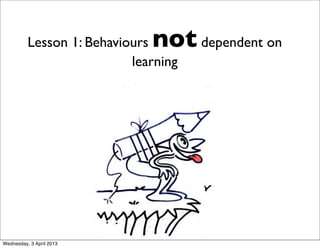Report
Share
Download to read offline

Recommended
More Related Content
What's hot
What's hot (20)
Operant Conditioning : Behavioral theory (B.F.SKINNER THEORY)

Operant Conditioning : Behavioral theory (B.F.SKINNER THEORY)
Dual credit psychology notes chapter 9 - learning(shortened for slide share)

Dual credit psychology notes chapter 9 - learning(shortened for slide share)
Similar to Lesson 1 behaviours not dependent on learning 2013
Similar to Lesson 1 behaviours not dependent on learning 2013 (20)
Lesson 1 behaviours not dependent on learning 2015

Lesson 1 behaviours not dependent on learning 2015
More from Crystal Delosa
More from Crystal Delosa (20)
U301 part b reforming the victorian criminal justice system

U301 part b reforming the victorian criminal justice system
U402 a court processes and procedures (working progress)

U402 a court processes and procedures (working progress)
Lesson 1 behaviours not dependent on learning 2013
- 1. Lesson 1: Behavioursnot dependent on learning Wednesday, 3 April 2013
- 2. What you need to know and be able to do by the end of the lesson • Define the term ‘learning’ • Explain the differences between reflex actions, fixed action patterns, and behaviours due to maturation Wednesday, 3 April 2013
- 3. In you own words try to define the term ‘Learning’ Wednesday, 3 April 2013
- 4. In you own words try to define the term ‘Learning’ Learning can be defined as any relatively permanent change in behaviour that may occur as a result of experience. Wednesday, 3 April 2013
- 5. Behaviours not dependent on learning Reflex Actions Fixed Action Patterns Maturation Wednesday, 3 April 2013
- 6. Reflex Actions A reflex is an innate, automatic reaction involving a simple rapid response to specific stimulus, which does not depend on conscious thought or processing by the brain. Wednesday, 3 April 2013
- 7. Reflex Actions A reflex is an innate, automatic reaction involving a simple rapid response to specific stimulus, which does not depend on conscious thought or processing by the brain. What is the purpose of reflexes? Wednesday, 3 April 2013
- 8. Fixed action patterns Fixed action patterns, also known as species-specific behaviours, are behaviours that occur among nearly all members of a species.These behaviours are typically more complex than a reflex. A fixed action pattern occurs when all members of a species produce a similar response to the same specific environmental stimuli. Wednesday, 3 April 2013
- 9. Maturation The orderly, sequential changes the body is genetically predetermined to undertake is referred to as maturation. Certain behaviours are not possible until a specific developmental stage has been reached. For instance, a child can not be toilet trained until they are maturationally ready, meaning they have to have developed the requisite ability to maintain bladder control. Wednesday, 3 April 2013
- 10. Activities Activity 1 Briefly describe three key characteristics of behaviour that is learned. Activity 2 Create a Venn Diagram with the headings, reflex actions, fixed-action pattern, and maturation. Activity 3 In pairs choose two good examples of each type of behaviour not dependent on learning and prepare a podcast showing the example. Wednesday, 3 April 2013
